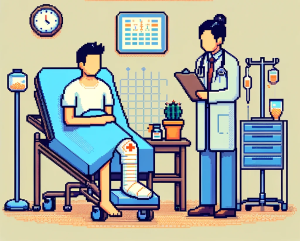
Advocacy in Public Health Education: A Crucial Need for Future Leaders
In an age where public health challenges are increasingly complex and intertwined with policy, the need for skilled advocates in the field is more crucial than ever. The recent study, Charting the Advocacy Landscape: A Qualitative Content Analysis of Syllabi in Public Health Graduate Education, published in the Journal of Public Health Management and Practice, provides invaluable insights into the current state of advocacy training in public health education.
The Core Findings: A Mixed Bag of Advocacy Training
The study delved into 98 course syllabi from accredited schools and programs of public health in the U.S., aiming to understand the advocacy content and skills being imparted to Master of Public Health (MPH) students. What emerges is a picture of a field in transition, with a significant focus on policy-related skills but less emphasis on comprehensive advocacy training.
Advocacy Skills: Present, But Not Predominant
The findings reveal that while advocacy skills are taught, they are not always the central theme of public health courses. Most courses incorporate advocacy as part of broader subjects like health policy or health care management. This approach, while beneficial, may not provide students with the depth and breadth of skills needed to be effective advocates in the field.
Equity Skills: A Notable Gap
A striking aspect of the study is the limited focus on equity-related advocacy skills. In a world where health disparities are stark, and issues like structural racism profoundly impact public health, this gap is concerning. Training future public health leaders to address these challenges through advocacy is not just important—it’s imperative.
Why Does This Matter for Public Health Practitioners?
Public health practitioners must be adept at navigating the policy landscape. This requires a skill set that goes beyond traditional public health knowledge. Advocacy skills are essential tools in this regard, enabling practitioners to influence policy, mobilize stakeholders, and drive meaningful change.
Bridging the Gap: The Role of Public Health Education
The study underscores the need for public health education to evolve, ensuring that advocacy training is not just an add-on but a core component of the curriculum. This evolution is critical for preparing a workforce capable of addressing today’s public health challenges effectively.
Empowering Change Agents: The Need for Comprehensive Advocacy Training
For public health practitioners to be effective change agents, they need comprehensive training in advocacy. This includes skills in policy communication, coalition building, media advocacy, and understanding how to navigate the complexities of equity and social justice in health.
Moving Forward: Recommendations and Implications
To address the gaps identified in the study, several steps can be taken:
- Defining Public Health Advocacy: Establishing a clear definition of what constitutes public health advocacy and identifying the essential skills required is a vital first step.
- Enhanced Training and Support: Providing additional resources and support to faculties to incorporate comprehensive advocacy training in public health courses is crucial.
- Experiential Learning: Integrating real-world advocacy experiences in the curriculum can provide students with practical skills and a deeper understanding of the challenges and opportunities in public health advocacy.
- Equity-Focused Training: Given the significant role of social determinants in health, embedding equity-focused training within advocacy courses is essential.
- Research and Development: Ongoing research is necessary to continually assess the effectiveness of advocacy training and make adjustments as needed.
Conclusion: The Path Ahead
The study highlights the need for a paradigm shift in how we train future public health leaders, emphasizing the role of advocacy in driving public health initiatives. For public health practitioners, this shift could mean the difference between policy success and failure, between advancing public health goals and remaining stagnant. Let’s take this opportunity to reshape public health education for a future where our practitioners are not just knowledgeable but also powerful advocates for health.
Unlock Your Public Health Potential – Subscribe Today!
Join the ranks of proactive change-makers with ‘This Week in Public Health.’ Elevate your understanding and engage directly with the latest in community health, innovative research, and advocacy. Every issue is more than just news – it’s a stepping stone to making a real difference. Subscribe for free now and be the change-maker in public health!



